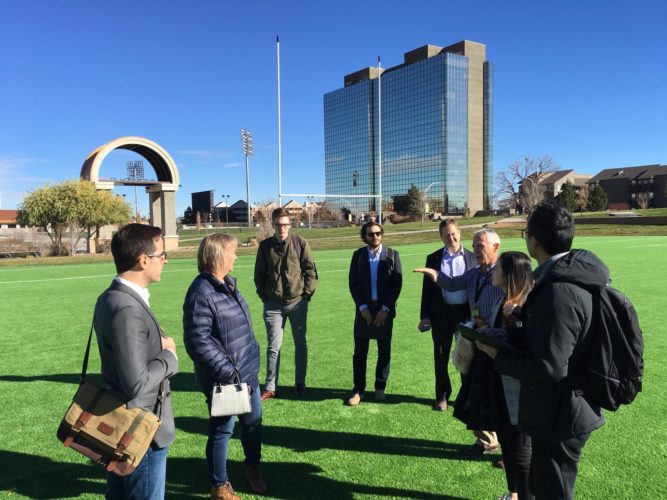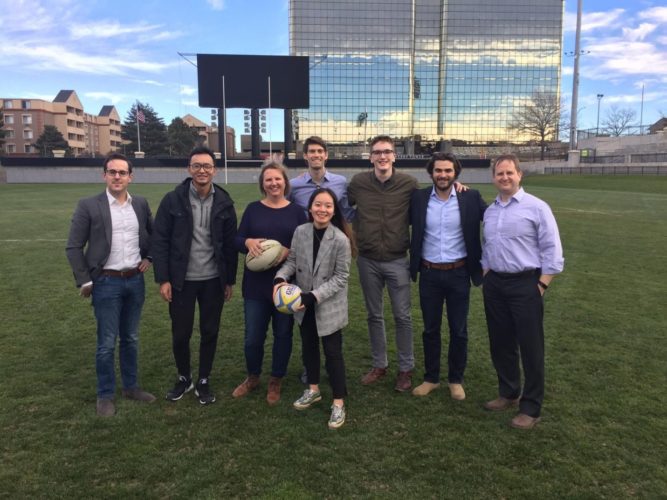Zandy Schorsch, MBA ’19, contributed this blog post on behalf of Olin’s Center for Experiential Learning.
Oscar Wilde once said that rugby is a good occasion for keeping 30 bullies far from the center of a city. This semester, students from the undergraduate and graduate levels of Washington University Olin Business School have been working with the Center for Experiential Learning to perform the opposite—assess the viability of bringing a professional rugby team to the city of St. Louis.
Rugby is one of the fastest growing sports in the United States, and Major League Rugby was founded last year to provide fans with professional-level rugby competition here in the states. The league kicked off its inaugural season with seven original teams. With nationally televised games on CBS and sold out tickets in many of the cities, there is a growing sense of optimism as MLR prepares for its second season.
The league has aggressive plans for expansion, with teams in New York and Toronto joining for the 2019 season and Atlanta, D.C., and Boston joining in 2020. St. Louis has emerged as one of the potential cities for an MLR expansion team, and the CEL was hired by a local entrepreneur to determine whether such a venture is feasible.
The CEL’s client, a husband and wife duo with a lifelong passion for rugby, believe the loss of the city’s football franchise has created an opening for rugby. Through dozens of interviews with rugby players, coaches, executives, and MLR league officials, the CEL team developed a strong understanding of how a rugby team in St. Louis would operate and the number of fans it would be able to attract.
Although St. Louis has always been a baseball town, there are hundreds of registered rugby players in the local area across all levels of the sport, as well as several nationally recognized rugby programs.
While the CEL team was able to develop a demand forecast for rugby in St. Louis, only so much can be learned about stadium financing and team operations from phone interviews and emails. As a result, the client decided to bring the CEL team to Glendale, Colorado, to meet with the Raptors, the MLR regular season champions, to learn more about the business side of rugby operations.

Learning about rugby operations from the Raptors.
During a full-day of meetings with the Raptors, the CEL team learned about stadium financing, team and stadium operating costs, revenue drivers, marketing and sales strategies, and unexpected expenses associated with managing a professional sports team.
The CEL team also got to learn the fundamentals of rugby from some of the professional players, such as tackling techniques and field goal mechanics.
While the CEL team requires more practice if they hope to play professionally, the data the team was able to collect from the Raptors proved invaluable for their analysis. The client capped off the trip with dinner at a local pub, a great opportunity for the student team to connect with their client informally.
Upon returning to St. Louis, the CEL team took the lessons learned from the Raptors to develop a financial model the client could use to make an informed decision about bringing professional rugby to St. Louis. The team developed an intuitive financial model that accounted for attendance numbers, concession sales, merchandise sales, stadium costs, advertising, and a host of other variables posed several challenges.
Effectively communicating the outputs from the financial model, as well as highlighting the key assumptions and inputs that produce those outputs, was also critically important.
By building a strong relationship with the client throughout the semester, and leveraging the abundant resources of the CEL and Washington University, the CEL team was able to provide a final deliverable that gave the client a holistic view of everything that goes into managing a professional sports team and stadium.
The financial analysis demonstrated that a team in St. Louis is feasible, so be on the lookout for a local MLR team in near future.
Overall, the CEL is a unique opportunity for students to work on real-world projects that have a direct impact on their community. Bringing a professional sports team to St. Louis is the type of project that major consulting firms and investment banks would be envious of, and for the clients who hire the CEL, they get to receive professional-level services from the very students who, upon graduation, will be joining those types of companies.



